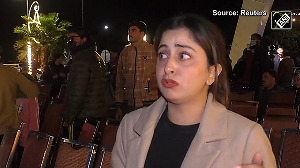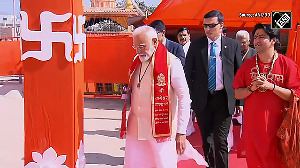All hands are literally on deck and the powerful US business lobby and the Indian-American community have once again come together to strategize on how to move the US-India nuclear deal ratification expeditiously in the US Congress if and when it clears the Nuclear Suppliers Group hurdle come end August or early September and arrives in the US when lawmakers return after the summer recess on September 8.
A core group of two dozen Indian-American community activists single-mindedly focused on pushing the deal through and comprising Washington,DC-based multimillionaire IT entrepreneurs like Ken Bajaj, Ranvir Trehan, Sudhakar Shenoy, and Indiana physician Bharat Barai, Chicago developer Niranjan Shah, New York hotelier Sant Chatwal and several others, under the leadership of North Carolina entrepreneur Swadesh Chatterjee, coordinator of the US-India Friendship Council, met last week with Under Secretary of State for Political Affairs Bill Burns -- who took over from Nicholas Burns, the chief US interlocutor of the deal, now retired from the Foreign Service -- to be briefed on the latest state of play as the Bush Administration readies to circulate the 123 Agreement proposal to the NSG.
This followed a dinner hosted for the group by Indian Ambassador Ronen Sen at his residence to provide then with a status report as to where India stood now that the International Atomic Energy Agency board of governors had approved the India safeguards agreement.
This group, under the umbrella of the US-India Friendship Council, also held a strategy session with the US-India Business Council with its president Ron Somers and Ray Vickery of Stonebridge International -- one of the lobbying firms hired by the USIBC to lobby on behalf of the deal -- and then fanned out to meet with the staff aides of the Congressional leadership, particularly that of Senate Majority Leader Harry Reid, House Speaker Nancy Pelosi and Senator Joe Biden, chairman of the Foreign Relations Committee, to discuss the procedural obligations of the Congress and the technicalities involved in the House and the Senate placing the agreement for floor action under the narrow window of two weeks -- that is if indeed the agreement clears the NSG and lands in the Congress after it reconvenes on September 8.
Meanwhile, the other powerful lobbying firm hired by the USIBC, Patton Boggs, also met with Burns and another meeting was on the cards between some of the leading corporate members of the USIBC and the top State Department official.
The leadership of the 8,500-member Asian American Hotel Owners Association, comprising Indian American hoteliers was also coming to town to meet with senior State Department officials to be part of the coordinated and concerted coalition to bring all of the influence to bear on the Congress to ratify the deal if and when it is cleared by the NSG.
But as much as this coalition of the business groups and Indian-American community activists were once again mobilized and gung-ho about going to work to try and make the deal happen, there was also anxiety about India's professed stand calling on the US to deliver on a 'clean exemption' without any conditions attached at the NSG, and fears that this could uncompromising stand by New Delhi could lead to the agreement being stuck in the NSG and not being cleared in time for Congressional action.
These apprehensions were echoed by US Ambassador to India, David Mulford, who told a teleconference of Delhi-based correspondents that India should refrain from talking about an unconditional waiver as it could be deemed 'provocative' ahead of the August 21 NSG meeting.
Apparently reflecting these concerns conveyed to the group who met with Burns, Chatterjee said, "India should also make some compromises at the NSG to ensure the consensus."
"India also has to play ball a bit," he told rediff.com if the NSG hurdle were to be cleared and the agreement brought back to the US Congressional court.
"As you know, even at the IAEA, quite a number of countries -- besides Pakistan and China -- had expressed reservations, and so it's going to be an uphill battle in the NSG to get the kind of clean exemption the US is trying to deliver."
Chatterjee said that "the State Department made us fully aware of the challenges in the NSG, and that's why we believe that India also has to make some small compromises and play ball to make this happen, because even after it comes here, the State Department has a lot of work with the presidential certifications and drafts before the agreement is sent to Congress -- and then of course, there will be a series of hearings."
While acknowledging that as soon as the agreement lands in the US, "We will continue working with the Congressional leadership," he asserted, "It's not an easy task at all. It's a tough road ahead particularly because of the logistics of the Congressional calendar and the 30-day clause which by itself could result in the clock running out."
On August 4, Acting State Department spokesman Gonzalo Gonzales said, "We've stated often our support for this deal and the belief that it's important not only for the bilateral relationship but also for nuclear security in the rest of the world."
"But now that the International Atomic Energy Agency has voted, we're going to look to discuss this issue with the members of the NSG," he said, and added, "We're hoping to get a positive result out of that some time in the next."
Gonzales said, "And then, hopefully we'll be able to represent this to Congress on September 8," when lawmakers return from their summer recess for a two-week session.
"We're going to be working with our contacts on the Hill to explain why we believe this is important, and, hopefully, we've be able to have a positive outcome of this."
Chatterjee said the community activists across the country had been alerted to contact their representatives and senators back in their districts to make sure they are apprised of the possible upcoming action in the Congress if the deal is cleared by the NSG, and that they should be on board with their support.
But he acknowledged, "In this particular case, it is not so much the grassroots because we believe the votes are there -- the majorities are there in both the House and Senate. But, it has much more to do with the leadership of the Congress bringing it up for floor action. So, we are not so much concerned about the voting -- we know it's there -- what we are concerned is if we can bring it to the floor on time in the very small window that is there in the Congressional calendar."
Chatterjee continued to reiterate that "it is not easy because it is now a logistical issue and there is no guarantee that it can be moved in this Congress and it could very well spill over to the next Administration and Congress. No question about it. There are absolutely no guarantees. It's going to be very, very tough."
One Congressional source close to the leadership in the House told rediff.com, "If anybody predicts that this can happen definitely in this session, and when exactly it will be taken up, they are lying. There are so many in-between things which are unknown and different lawyers are looking at all of this and there's a lot of disagreements on the parliamentary procedures than can or cannot be used."
"It's finally going to come down to the political will of the leadership," the aide said, and added, "there is zero chance if there is no political will."
Another source, working for one of the lobbying firms hired by the USIBC said, "What we are all doing right now is working very hard to try to generate that political will, but it's not very easy because right now with Congress in recess, it's not on the radar and that's going to be the challenge -- getting it back on the radar. So it's a process. "
Former Congressional Research Service analyst Sharon Squassoni, now a senior associate with the Carnegie Endowment's Nonproliferation Center, and an expert on the Congressional procedures and process, said, "It's highly unlikely that the Senate Foreign Relations Committee and the House Foreign Affairs Committee is going to suspend the rules that exist in the Hyde Act for consideration of the 123 Agreement, which must lie on the table for 30 days and then the two committees should hold hearings on the agreement and that could take quite a long time," and the clock would run out.
She said it was not simply a requirement of the Hyde Act, but also a requirement of the Atomic Energy Act from which the Hyde Act -- which was enabling legislation provided the exemption for India as a non-signatory to the Nuclear Nonproliferation Treaty to be eligible for US civilian nuclear reactors and nuclear fuel.
Squassoni also argued that "it is sometimes tough for Congress to focus on things that are not directly before them, and so, until the 123 Agreement comes to the Hill, it's not entirely clear to me that they've gone though each and every aspect of the 123 Agreement or the safeguards agreement -- that's going to come later."
"(But) I would say the thing that has galvanized Congress with respect to this agreement is what India has or has not done with Iran, and, to the extent than any new information comes to light, that could have an impact," she predicted.






 © 2025
© 2025